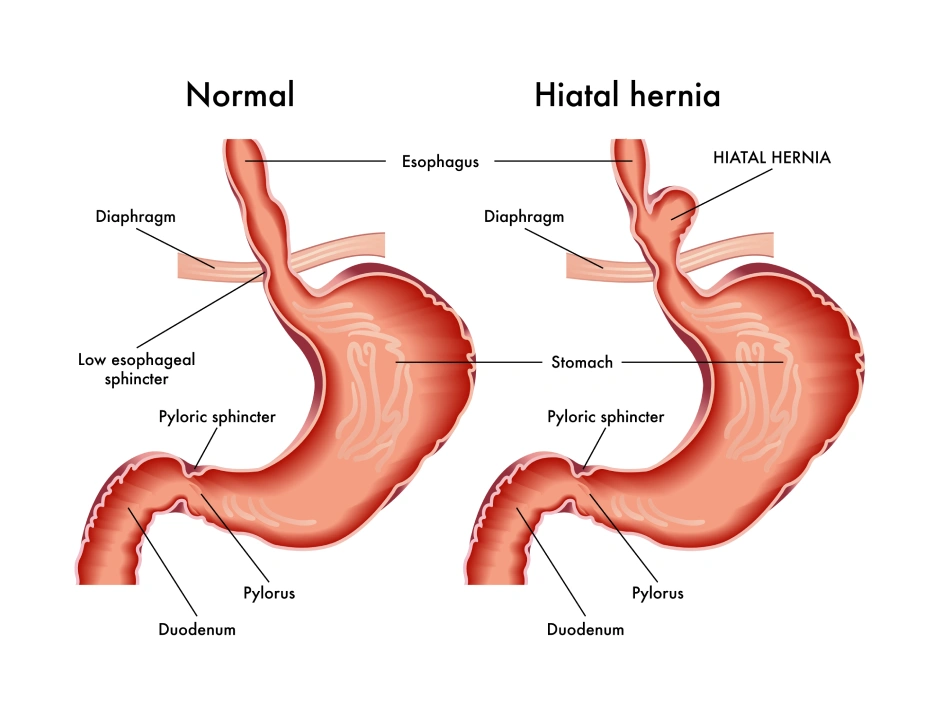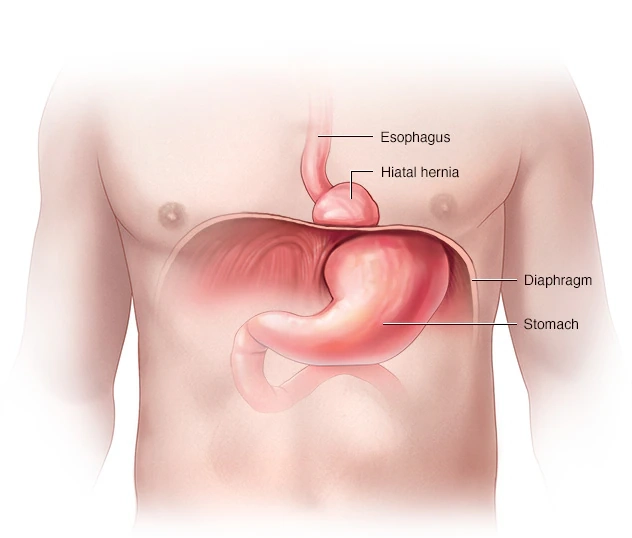Hiatus Hernia Surgery
Expert Care, Minimally Invasive Solutions for Hernia Repair
Selecting the right surgeon for hernia surgery is crucial. Dr Sherif Awad specialises in laparoscopic surgery, focusing on hiatus hernias. He offers thorough care for patients with hernias, including those of the hiatus.
With years of experience, Dr Sherif provides effective, minimally invasive options for repairing hiatus hernias. His wealth of expertise ensures that each patient receives tailored and attentive care, striving for the best possible results.
Understanding Hiatus Hernias: What You Need to Know
A hiatus hernia develops when part of your stomach pushes through into your chest area. This happens through an opening in your diaphragm, the muscle that helps you breathe. This condition is more likely to occur in individuals aged 50 and above. Often, a hiatus hernia doesn’t cause any symptoms, and you might not know you have it. However, for some, it can lead to discomforts that affect daily life. Symptoms can include heartburn, acid reflux, or difficulty swallowing.
Typical Signs of Hiatus Hernia
- Heartburn (A sharp, burning pain in the chest, usually after eating)
- Reflux (Small amounts of food returning with a burning sensation)
- Bad Breath (A foul odour in the mouth from stomach acid or bile)
- Bloating (A feeling of fullness or swelling in the stomach)
- Nausea (A sick feeling in the stomach that can lead to vomiting)
- Dysphagia (Difficulty swallowing or the sensation of food sticking)
These symptoms are also common in gastro-oesophageal reflux disease (GORD), which may occur alongside a hiatus hernia.
What Is Hernia Surgery?
A Minimally Invasive Solution
This surgery is usually quick and highly effective, with most patients experiencing significant relief from symptoms. Hernia surgery not only helps alleviate pain and discomfort but also prevents complications such as obstruction or strangulation of the organ.
- Long-term solution for hernia repair
- Relieves pain and discomfort
- Improves daily mobility and quality of life
- Quick recovery with minimally invasive options
Book A Consultation with Dr Sherif Awad to Determine If Hiatus Hernia Surgery is Right for You.
Effective Ways to Manage Hiatus Hernia Symptoms
For people with mild symptoms, making some lifestyle changes can help reduce the discomfort caused by a hiatus hernia:
Do’s
- Eat Smaller, Frequent Meals
- Raise the Head of Your Bed
- Maintain a Healthy Weight
- Maintain a Healthy Weight
Don’ts
- Avoid Trigger Foods and Drinks
- Don’t Eat Late at Night
- Avoid Tight Clothing
- Quit Smoking
- Limit Alcohol Intake
By following these simple lifestyle adjustments, many individuals with a hiatus hernia can effectively manage their symptoms and improve their overall quality of life. However, if symptoms persist or worsen, it’s important to seek medical advice for further evaluation and treatment.
Diagnosis of Hiatus Hernia
Diagnosing a hiatus hernia usually requires a few tests to find the cause of symptoms like heartburn or chest pain. The most common tests include:
- Endoscopy: A camera tube examines the food pipe and stomach to check for issues.
- Oesophageal pH and Manometry Study: Measures oesophageal muscle function and acid reflux.
- Barium Swallow: BariumX-rays taken after swallowing a liquid to outline the oesophagus and stomach.
Managing Hiatus Hernia: Treatment & Relief
A hiatus hernia often does not require treatment unless it causes discomfort. If symptoms become troublesome, treatment options include medication and surgery.
Medication Options
- Antacids: Neutralise stomach acid for quick heartburn relief, but overuse may cause side effects.
- Receptor Blockers: Reduce acid production for longer-lasting relief (e.g., Famotidine).
- Proton Pump Inhibitors (PPIs): Stronger acid blockers that help heal the oesophagus.
Surgical Options
Surgery required only if medication fails or causes side effects. Dr. Sherif Awad Specialises in hiatus hernia repair and tailors’ treatment to each patient’s needs.
- Laparoscopic Surgery: Minimally invasive procedure with small incisions and a camera to repair the hiatus hernia.
- Anti-reflux Procedure: Often performed alongside surgery (e.g., Nissen fundoplication) to create a stronger valve at the top of the stomach.
Find Out If You’re A Candidate Schedule A Consultation Today!
What to Anticipate:
Key Stages of Hiatus Hernia Surgery
Undergoing hiatus hernia surgery can feel overwhelming, but understanding what to expect at each stage can help ease anxiety and support a smoother recovery. Below is a breakdown of the key phases—before, during, and after surgery—to help you prepare with confidence.
- Pre-operative Preparations
- During Surgery
- Post-operative Care
- Consultation with Dr. Awad to discuss symptoms and medical history.
- Dr. Awad will explain the benefits and risks of the surgery.
- Tests such as endoscopy and pH/manometry study to assess GORD severity.
- The procedure is performed under general anaesthesia.
- Small incisions are made for laparoscope and surgical instruments.
- Stomach is wrapped around the lower oesophagus to prevent acid reflux.
- Most patients can return home the same day or after an overnight hospital stay.
- Specific instructions on diet and activity restrictions will be provided.
- Difficulty swallowing is common initially but improves over time.




Risks And
Considerations
- Includes infection, bleeding, or adverse reactions to anaesthesia.
- Temporary difficulty swallowing, bloating, or discomfort during the healing process.
- Possibility of recurrence of the hiatus hernia or reflux symptoms over time.
- Surgery may not be suitable for all patients, especially those with certain health conditions.
Client Stories:
Real-Life
Transformations
Life-Changing Relief from Acid Reflux
I was struggling with acid reflux and discomfort for years. Dr Sherif Awad provided expert advice and a clear treatment plan. The surgery went smoothly, and my recovery was quick. I feel so much better now and can finally enjoy meals without discomfort. Highly recommend his expertise!
Alex
A Supportive Journey to Recovery and Better Health
From my first consultation, Dr Awad made me feel at ease. He explained everything clearly and answered all my questions. The surgery was a success, and I experienced minimal pain during recovery. His team was supportive throughout. I’m so grateful for the care I received and my improved health
Alessia
Freedom from Hiatus Hernia with Expert Surgical Care
Living with a hiatus hernia was difficult, but Dr Awad changed everything. His expertise and personalised approach gave me confidence in my treatment. The surgery was smooth, and my symptoms disappeared. I feel healthier and happier thanks to his exceptional care. I would recommend him to anyone needing hernia surgery
Lathan
FAQs:
Common Questions About Hiatus Hernia Surgery
Dr Sherif Awad specialises in treating all types of hernias, including hiatus, inguinal, umbilical, and incisional hernias. He provides expert diagnosis and personalised treatment plans for each patient.
If you experience persistent discomfort, pain, acid reflux, or difficulty swallowing, you may need medical attention. Dr. Awad will assess your condition during a consultation and recommend the most suitable treatment, whether lifestyle changes, medication, or surgery.
During your consultation, Dr Awad will review your medical history, discuss your symptoms, and explain your treatment options. He ensures every patient receives clear, professional advice and a tailored treatment plan.
To schedule a consultation, contact Dr Sherif Awad’s office. His team will guide you through the booking process and provide any necessary information to help you prepare for your appointment.

Expert Hernia Specialist You Can Trust!
Don’t let Hiatus Hernia control your life. Dr Sherif Awad specialises in minimally invasive Hiatus Hernia surgery to provide long-lasting relief.
Call us now or Book an Appointment Online!




